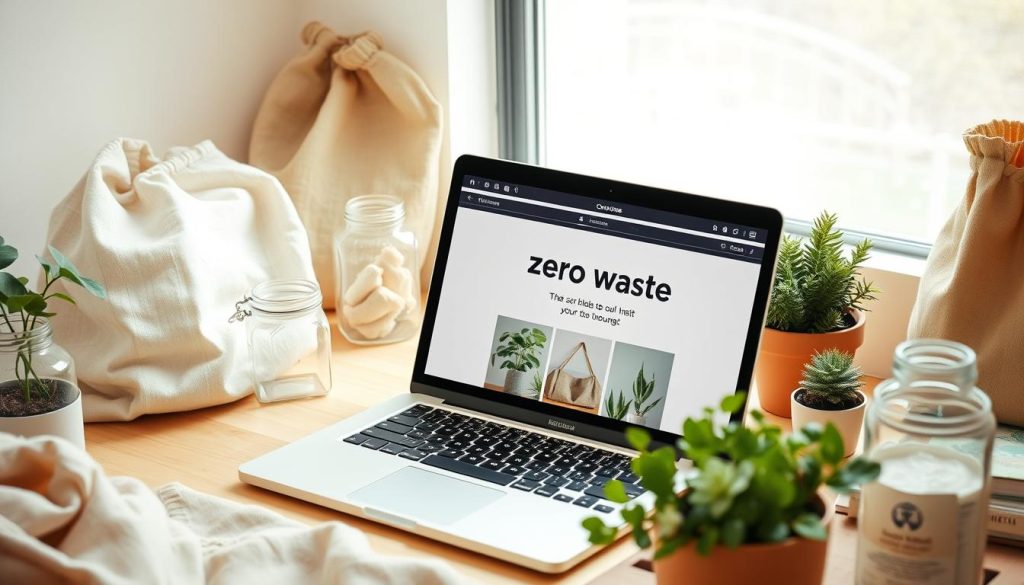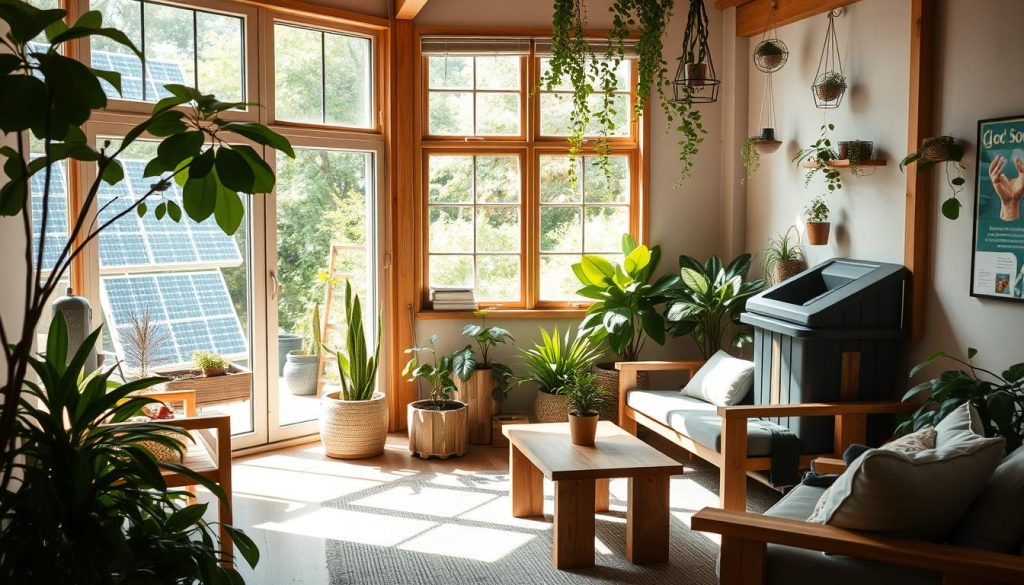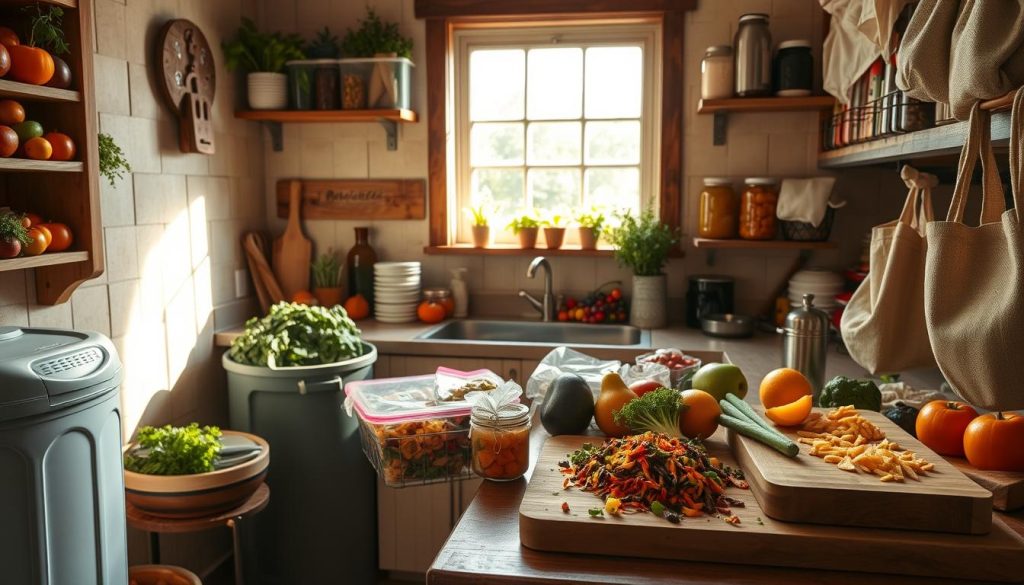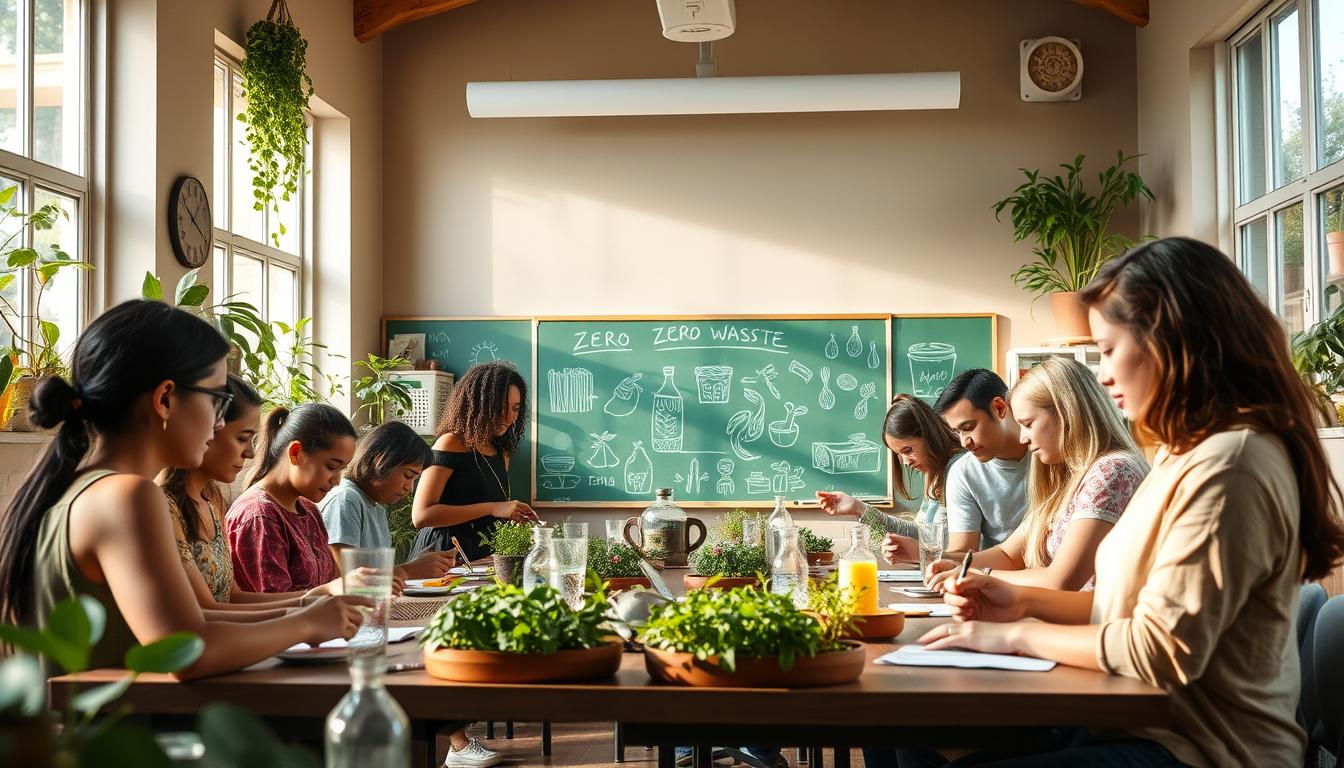I’m passionate about reducing my environmental impact. Online zero waste courses have been a game-changer for me. They’ve taught me how to live more sustainably through virtual classes.
These courses are flexible, allowing me to learn at my own pace. They cover everything from waste management to upcycling. This knowledge has helped me make big changes in my daily life.
What I love most about these courses is how accessible they are. They’re available to anyone, no matter where they are. This has made sustainable living more inclusive.
I’m excited to see how these courses will keep growing. They’re helping more people live sustainably. I’m confident that together, we can make a big difference.
Introduction to Zero Waste Living
Starting a zero waste lifestyle is a big step towards a better future. It’s about changing how we see the environment and finding new ways to cut down on waste. With eco-friendly programs and online workshops, people can learn to live in a way that helps our planet.
What is Zero Waste?
Zero waste means we try to get rid of waste altogether. We aim to reduce, reuse, recycle, and compost as much as we can. This way, we can make a big difference and help our planet stay healthy.
Benefits of Adopting a Zero Waste Lifestyle
- Reduced household waste and financial savings
- Decreased reliance on single-use plastics and disposables
- Improved environmental sustainability and conservation of natural resources
- Fostering a more mindful and purposeful approach to consumption
- Inspiring others to embrace eco-friendly practices
Overview of Online Courses
Online courses are a great way to learn about zero waste living today. These digital programs offer lots of information, tips, and support. They help anyone, from beginners to those looking to learn more, on their path to a greener future.
Finding the Right Online Zero Waste Course for Me

I’m eager to learn about zero waste living and found many online courses. Choosing the right one is tough with so many options. I’ll look at the course’s content, structure, reviews, and price to make a good choice.
Course Content and Structure
I want a course that teaches a lot about living sustainably. It should cover how to reduce waste, upcycle items, and shop eco-friendly. I also need courses with practical activities and assignments to apply what I learn.
Reviews and Ratings
Reviews and ratings from others are key. I’ll search for courses with lots of positive feedback. This shows the instructor’s skill, the course’s quality, and its impact on students’ lives. It helps me find a course that will really change my life.
Price Comparisons
Cost is important, but not the only thing. I’ll compare prices to find a course that’s affordable but still valuable. I’ll also check for discounts or payment plans to make it easier to afford.
By looking at the course’s content, structure, reviews, and price, I can pick the best online zero waste course. It will help me live more sustainably and meet my goals.
Creating a Sustainable Home Environment

Starting an eco-friendly lifestyle begins at home. We can reduce household waste, use zero-waste tools, and upcycle items. This makes our homes sustainable, following waste reduction and eco-friendly programs.
Strategies for Reducing Household Waste
To make a home sustainable, we must cut down on waste. Here are some ways to do it:
- Implementing a comprehensive recycling system
- Composting organic waste
- Avoiding single-use plastics and opting for reusable alternatives
- Mindfully purchasing only what is needed to reduce food waste
Essential Tools and Containers
For a zero-waste lifestyle, we need the right tools and containers. Some must-haves are:
- Reusable shopping bags and produce bags
- Glass jars and containers for storage
- Stainless steel or bamboo straws
- Reusable water bottles and coffee cups
Tips for Upcycling Household Items
Don’t throw things away; upcycle them instead! Here are some ideas to breathe new life into household items:
- Transform old clothing into reusable rags or cleaning cloths
- Repurpose glass jars as storage containers or vases
- Upcycle cardboard boxes into organizers or craft supplies
- Reuse aluminum foil or plastic bags for various household tasks
By using these strategies, tools, and upcycling ideas, we can make our homes sustainable. This aligns with waste reduction and eco-friendly lifestyle programs.
Cooking and Eating Zero Waste

My journey towards sustainable living has shown me the importance of zero waste cooking and eating. Simple kitchen strategies can greatly reduce food waste and carbon footprint. It’s a big step towards a greener lifestyle.
Meal Planning to Minimize Waste
Meal planning is a big help in cutting down waste. I plan my meals for the week, using what I already have. This saves time, money, and prevents food from being thrown away.
Creative Recipes Using Leftovers
Using leftovers has opened up a world of cooking creativity. I turn veggies into soups and extra rice into fried rice. It’s fun and helps reduce waste, letting me try new recipes.
Composting Basics
- Composting is a big part of my zero waste life. I have a compost bin for food scraps and organic stuff. It turns into soil for my garden.
- Composting cuts down on landfill waste and feeds my plants. It’s a simple way to help the environment.
- Online workshops and resources taught me how to compost. I learned about the right mix of materials and keeping it moist.
Learning about sustainable living has changed how I cook. Meal planning, using leftovers, and composting help reduce waste. It’s a big step towards a greener life.
Eco-Friendly Shopping Habits
I’m passionate about living sustainably. I’ve learned that shopping wisely is key. It cuts down on waste and supports a circular economy. By choosing eco-friendly options, I’ve made a big difference in my life.
How to Shop Responsibly
Shopping wisely begins with knowing what you buy. I research brands and products for their green and ethical efforts. I avoid buying on impulse and only get what I need. This way, I waste less and spend in line with my values.
The Importance of Bulk Buying
Bulk buying has been a game-changer for me. It cuts down packaging waste and saves money. It’s great for things like household items, food, and personal care.
Recommended Zero Waste Brands
I’ve found some amazing zero waste brands. They focus on sustainability and use eco-friendly materials. My favorites are Blueland, by Humankind, and The Little Market.
These habits have helped me consume less and support a greener economy. Online resources have been a big help in my journey. They guide me in making better choices.
Raising Awareness and Involving Others
As I explored zero waste living, I saw how vital it was to share my journey. I wanted to inspire others to join the movement. So, I started talking about virtual environmental classes and e-learning green initiatives.
Sharing My Journey with Family and Friends
I began by talking to my family and friends about zero waste living. I shared the online courses I took and how they changed my life. I encouraged them to check out virtual environmental classes and e-learning green initiatives.
Hosting Zero Waste Workshops
- I organized workshops in my community for neighbors and others to learn about reducing waste.
- I taught them how to upcycle, plan meals to waste less food, and shop responsibly.
- People loved it and wanted to start living zero waste too.
Engaging with the Local Community
- I contacted schools, community centers, and environmental groups to work together.
- We held eco-friendly crafting workshops and community clean-ups together.
- These events raised awareness and brought our community closer to zero waste living.
My zero waste journey has made a big difference. By sharing and working with others, I’ve inspired my community. Together, we’re making our future greener and more sustainable.
Challenges and How to Overcome Them
Starting a zero waste journey is rewarding but comes with challenges. Many in web-based and online zero waste courses face similar obstacles. With the right mindset and resources, these hurdles can be overcome.
Common Obstacles in Zero Waste Living
One big challenge is the initial cost of transitioning to zero waste. Buying reusable bags and glass containers, and sustainable kitchen tools, can be expensive. But, these costs often save money in the long run by reducing waste.
Finding time and energy for new zero waste habits is another obstacle. Work, family, and other duties can make it hard to plan meals and sort waste. Start small and build sustainable habits that fit your life.
Finding Support and Resources
Community support is crucial on the zero waste journey. Online forums, local meetups, and social media groups offer valuable advice and inspiration. These communities help troubleshoot, share tips, and keep you motivated.
Celebrating Small Wins
Celebrating small victories is key when changing your lifestyle. Reducing household waste or trying new zero waste recipes are great achievements. Acknowledge your progress to stay motivated and overcome challenges.
Conclusion and Next Steps
Reflecting on my journey through online zero waste courses, I’m filled with inspiration. Sustainable living can greatly benefit the environment and our health. I’ve learned strategies to reduce waste and shop more eco-friendly.
Continuing My Zero Waste Journey
I’m eager to keep learning and growing in my zero waste journey. I’ll look for more online resources and dive into circular economy studies. This will help me deepen my commitment to living waste-free.
Additional Resources and Reading Materials
I plan to find more books, blogs, and podcasts on zero waste living. These will help me stay informed and keep my efforts effective. This way, I can make sure my sustainable actions keep making a difference.
Joining Zero Waste Communities and Forums
Connecting with others who care about sustainability is key. I’ll join online forums, attend virtual events, and meet local advocates. This will help me build a supportive community and inspire others to live more sustainably.

